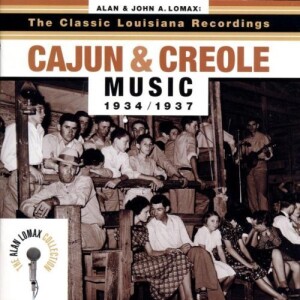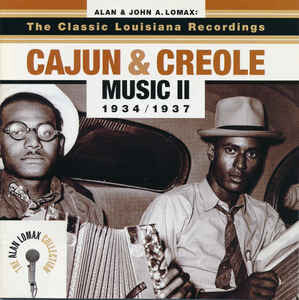 Between 1934 and 1937 father and son folklorists John and Alan Lomax recorded Cajun and Creole musicians in Louisiana, as part of a national project for the Library of Congress. Musicians from the region have been mining that treasure trove since the late 1970s, in addition to the ongoing music created in the community, creating the current explosion in Zydeco and Cajun music.
Between 1934 and 1937 father and son folklorists John and Alan Lomax recorded Cajun and Creole musicians in Louisiana, as part of a national project for the Library of Congress. Musicians from the region have been mining that treasure trove since the late 1970s, in addition to the ongoing music created in the community, creating the current explosion in Zydeco and Cajun music.
Legendary record producer Floyd Soileau released a double album of recordings from the archives in the late 1980s, and now Rounder has re-released those recordings plus many others on this two-CD set, as part of a huge ongoing archival release of The Alan Lomax Collection. The music on these two CDs is to Cajun and Zydeco what the Harry Smith Anthology is to folk-rock and alt-country. For fans of these Louisiana musical cousins, these discs are a revelation, the aural equivalent of finding a box of pictures of your grandparents in the attic.
 It’s a testimony to the skills and inventiveness of today’s musicians that they have created two such rich and complex musical styles out of the bare bones captured in the 1930s’ field recordings. But it’s even more of a testimony to the beauty and durability of this original music and the people who made it that it continues to speak so strongly some seven decades later.
It’s a testimony to the skills and inventiveness of today’s musicians that they have created two such rich and complex musical styles out of the bare bones captured in the 1930s’ field recordings. But it’s even more of a testimony to the beauty and durability of this original music and the people who made it that it continues to speak so strongly some seven decades later.
Each of these discs contains two parts. Volume I starts with 11 tracks of unaccompanied vocals by various membrs of the Hoffpauir Family, followed by as many tunes and songs featuring fiddle and accordion, sometimes solo, sometimes accompanying vocalists. Volume II features a dozen “Ballads, Laments and Drinking Songs,” followed by 10 tracks of zydeco, juré and blues.
With a few exceptions, the works are of rough quality. These are not professional musicians, but working people who for the most part led quite difficult and strenuous lives. Their raw talent is undeniable, but anyone expecting studio-quality professional work will be disappointed. The recordings were made in people’s homes, workplaces and yards, and in some cases apparently in bars. The recording equipment was rudimentary and primitive, cutting directly onto aluminum discs which, though of low fidelity, will last nearly forever.
Two of the most startling exceptions to the amateur classification of the musicians are fiddler Wayne Perry and singer Edier Segura. It’s a crying shame that neither of these men ever entered a studio and laid down recordings that were state-of-the-art for those days. Perry fiddles with precision and expressiveness to match any of the great fiddlers of the 20th Century.
And the unaccompanied ballad “Le pays des Etrangers” by Edier Segura is one of the most spine-tingling pieces of singing I’ve ever heard, worth the price of this collection all by itself. Every time I hear it, it reminds me of the first time I heard Edith Piaf on the radio.
There is much more of value here. Indeed, every track has something to offer. The singing Hoffpauir family is enchanting, especially Elita, who sings several tracks alone or with her sisters. An accordionist named Oakdale Carriere sings a short prison lament from inside the walls of Angola State Prison. The several examples of juré, with its clapping and stomping polyrhythms and call-and-response vocals, look back to Africa and forward to today’s funky zydeco. Joseph Jones sings a deep delta-style blues moan in “Blues de la Prison.” And Cleveland Benoit and Darby Hicks sing a long blues lament, alternating verses in Cajun French and Creole patois.
Each disc is accompanied by a thick booklet with notes by Alan Lomax and the series producer, author and Louisiana music scholar Barry Jean Ancelet; archival photos; an explanation of each song; and lyrics in French and English. Altogether, Rounder has done an exemplary job with this project. This is a priceless collection of outstanding American roots music.
(Rounder, 1999)
